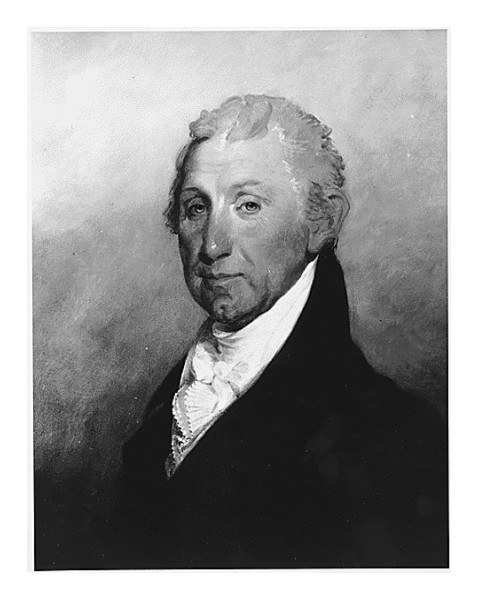
Image above: President James Monroe. Image right: Triumph, depicting eventual victory of Union, with reference to the Missouri Compromise. Created by Morris H. Traubel, 1861. Images courtesy Library of Congress.
Sponsor this page for $200 per year. Your banner or text ad can fill the space above.
Click here to Sponsor the page and how to reserve your ad.
-
Timeline
-
More
-
More
-
More
-
More
-
More
-
More
-
More
-
More
-
More
-
More
-
More
-
More
-
More
-
More
-
More
-
More
-
More
-
More
-
More
-
More
-
More
-
More
-
More
-
More
-
More
-
More
-
More
-
More
-
More
-
More
-
More
1820
February 6, 1820 - Free African American colonists, eighty-six in number, plus three American Colonization society members, leave the United States from New York City and sail to Freetown, Sierra Leone.
March 3, 1820 - The Missouri Compromise bill, sponsored by Henry Clay, passes in the United States Congress. This legislation allows slavery in the Missouri territory, but not in any other location west of the Mississippi River that was north of 36 degrees 30 minutes latitude, the current southern line of the state of Missouri. The state of Missouri would be admitted to the Union, under this compromise, on August 10, 1821.
August 7, 1820 - Population in America continues to rise. The census of 1820 now includes 9,638,453 people living in the United States, 33% more than in 1810. The most populated state is New York, with 1,372,812 residents. The center of U.S. population now reaches 16 miles east of Moorefield, West Virginia.
September 28, 1820 - To prove that a tomato is not poisonous, Colonel Robert Gibbon Johnson eats one in public in Salem, New Jersey.
November 1 to December 6, 1820 - The election of James Monroe to a second term in office comes with a landslide victory in the Electoral College with Monroe defeating John Quincy Adams by a tally of 231 to 1.
Buy Chronology

1821
February 23, 1821 - The first pharmacy college is founded in the Philadelphia College of Apothecaries. Also this same year, the first women's college in the United States of America, Troy
Female Seminary, is founded by Emma Willard.
July 10, 1821 - Possession of the territory of Florida is taken by the United States after its purchase is completed with Spain. No money exchanged hands between Spain and the U.S. in this
purchase; the U.S. had agreed to pay five million dollars to
citizens for property damage.
August 4, 1821 - The Saturday Evening Post is published for the first time as a weekly newspaper by Atkinson and Alexander.
November 16, 1821 - The first legal international trade on the Santa Fe Trail began after William Becknell, a Missouri trader, met with Governor Melgares one day earlier. The huge profit earned convinced Becknell that he should return over the trail route the following year.
A Massachusetts court outlaws the novel, Fanny Hill, by John Cleland, and convicts publisher Peter Holmes for printing a "lewd and obscene" novel. This was the first obscenity case in U.S. history.
1822
January 7, 1822 - The first group of freed American slaves settle a black colony known as the Republic of Liberia when they arrive on African soil at Providence Island. The capital, Monrovia, is named after President James Monroe.
February 13, 1822 - Advertisements for Ashley's Hundred, organized by General William H. Ashley and Major Andrew Henry, to ascend the Missouri River on a fur trading mission, appear in Missouri newspapers. The men who would answer the call to employ included Jedediah Smith and Jim Bridger. Over the next decade, these expeditions would leave St. Louis at irregular intervals.
March 30, 1822 - Florida becomes an official territory of the United States.
April 27, 1822 - Civil War general and 18th President of the United States, Ulysses S. Grant, is born.
May 6, 1822 - A law prohibiting the sale of alcohol to Indians is passed, causing a disruption in the fur trade pattern that relied on the Indians to trap and hunt for the furs, in exchange for alcohol and other goods.
1823
April 3, 1823 - American political boss, William Magear Tweed, is born.
April 5, 1823 - Act signed for funding of the creation of the Albany Basin, a man-made port linked to the Erie Canal, in Albany, New York, is appropriated.
April 25, 1823 - The War Department issues order for an expedition up the Red River and along the 49th parallel led by Stephen Long, which would mark the point of the official border between the United States and Canada.
August 9, 1823 - Arikara Indian War begins as the U.S. Army engages in the first conflict with an Indian tribe in the western territories after the tribe had attacked a trapping party on June 1.
December 2, 1823 - In a speech before Congress, James Monroe announces the Monroe Doctrine, stating the policy that European intervention anyplace in the Americas is opposed and that he would establish American neutrality in future European wars.
1824
March 11, 1824 - The Bureau of Indian Affairs is established by the United States War Department. This department is meant to regulate trade with Indian tribes.
April 17, 1824 - A frontier treaty between the United States and Russia is signed, negotiated by the Secretary of State under James Monroe, John Quincy Adams. Russia agreed to set its southern border at 54 degrees, 40 minutes and allow U.S. ships within the one hundred mile limit of its Pacific territories.
May 24, 1824 - In Pawtucket, Rhode Island, the first strike by female workers occurs.
December 2, 1824 - When the Electoral College vote yielded no majority, John Quincy Adams would be elected president by the House of Representatives on February 9, 1825, outpolling fellow Democrat Republicans, now a loose coalition of competing factions, including Andrew Jackson, who had actually received a higher number of Electoral College votes, 99, than Adams, 84. It was not a majority due to votes for Henry Clay, 37, and William Crawford, 41. In the first election with popular vote totals, Adams garnered less votes there as well, with 105,321 to 155,872 to Jackson.
December 24, 1824 - The first fraternity in the United States is begun, Chi Phi, at Princeton University.
1825
February 12, 1825 - In the state of Georgia, the Creek Indian tribe give up their last lands to the United States government, leading to their move west.
March 4, 1825 - John Quincy Adams is inaugurated as President, with John C. Calhoun as his Vice President after the House of Representatives settle the lack of an Electoral College majority.
October 26, 1825 - Use of the Erie Canal began in Buffalo, New York with the first boat departing for New York City. This opened up the Great Lakes region by cutting the travel time between the two cities one third and shipping costs nine tenths. Cost of the canal was $7 million. On November 4, 1825, the first boat navigating the Erie Canal arrived in New York City. The opening of the Erie Canal contributed to making the city of New York a chief Atlantic port.
November 26, 1825 - The first college social fraternity, Kappa Alpha, is formed at Union College, Schenectady, New York.
1825 - The first experimental steam locomotive is built and operated by John Stevens, of Hoboken, New Jersey, to prove the viability of railroads. It would be given its first public test in May 1826.
1826
April 1, 1826 - The internal combustion engine named the "Gas Or Vapor Engine" is patented by American Samuel Morey.
July 4, 1826 - Two founding members of the United States pass away on Independence Day; Thomas Jefferson, 3rd President, and John Adams, 2nd President. On the same day, Stephen Foster, American songwriter and poet, is born.
September 3, 1826 - The first United States warship to navigate the world, the U.S.S. Vincennes, leaves New York City under the command of William Finch.
October 26, 1826 - Kit Carson, mountain man of the western lands, is wanted in Franklin, Missouri, after running away to join a trading party at the age of 16. A reward of one cent is offered for his return to his bondage to learn the saddler's job in Franklin. In 1826, David Edward Jackson, for whom Jackson Hole, Wyoming is named, as well as Jedediah Smith and William Sublette purchase William Ashley's interest in the fur trade, and the company, later to become known as the Rocky Mountain Fur Company when these men sold in 1830, continued to profit from the fur trade across the mountain west.
December 21, 1826 - Group of Texas settlers make first attempt to secede from Mexico in the Fredonian Republic. Republic of Fredonia lasts one month, causes Mexican government to curb immigration from U.S. to region and increased dissatisfaction that leads to eventual Texas Revolution.
1827
February 26, 1827 - The Senate ratifies the Treaty of Limits that establishes the Sabine River as the Mexican and United States border, in agreement with the Adams-Onis Treaty of 1819.
February 28, 1827 - The Baltimore and Ohio Railroad is incorporated, and would become the first railroad in the United States to offer transportation for people and commercial goods.
July 4, 1827 - In New York State, slavery is legally abolished.
July 14, 1827 - The first Roman Catholic Mass is held in the Hawaiian Islands and leads to the foundation of the Diocese of Honolulu.
September 22, 1827 - Joseph Smith, Jr. claims the angel Moroni gives him a record of gold plates, later translated into The Book of Mormon.
1828
January 12, 1828 - The Treaty of Limits with Mexico goes into effect.
April 14, 1828 - The copyright for The American Dictionary of the English Language is registered and the book published that year by Noah Webster.
July 4, 1828 - The first passenger railroad in the United States, the Baltimore and Ohio, begins.
October 31 to December 2, 1828 - After a tumultuous four years of national politics, the election for president sees a popular and electoral college vote victory of 178-83 for Andrew Jackson over President John Quincy Adams.
October 28, 1828 - Opposing the Tariff of Abominations, the state of South Carolina begins the process of a formal nullification campaign, declaring the right of state nullification of federal laws.
1829
February 26, 1829 - Levi Strauss, American clothing designer and jeans entrepreneur, is born. He would be credited with manufacturing the first blue jeans.
March 4, 1829 - Andrew Jackson, now in the Democratic party, is inaugurated as President, replacing John Quincy Adams after his sole term in office.
June 1, 1829 - The Philadelphia Inquirer newspaper is founded. It was initially known as the Pennsylvania Inquirer.
June 27, 1829 - The Smithsonian Institution is founded when British scientist James Smithson bequeathed one hundred thousand pounds ($500,000) from his estate for its initial funding, on the condition that his nephew have no heirs. The establishment of the Smithsonian would be passed by an act of Congress in 1846 and was completed in 1855. The Smithsonian complex, on the National Mall in Washington, D.C., now includes 19 museums and 142 million items in their collection.
July 23, 1829 - William Austin Burt, of the United States, invents and patents the typewriter, at the time called the typographer.






